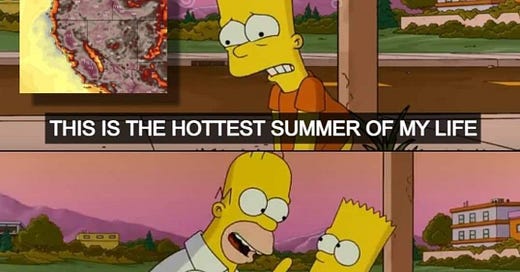Summer in Seattle has been pretty temperate so far—not the fire and brimstone-esque heat and wildfires defining the Pacific Northwest in 2021 and 2022. More or less the only part of the continental US that has had relatively historically normal weather this season, which is great for me, personally.
And yet it’s a big existential bummer to feel a little glee that this meme isn’t true 100% of the time for me, it’s “just” true for the planet as a whole. Earth just experienced its warmest month on record:
My personal balm is attending Mariners games (as we know) and being outside as much as I can. Another salve is techno-optimism and holding onto the belief that, through ~*divine innovation*~ (see what I did there), we’ll be able to reverse many of the effects of climate change through as-yet-invented or -distributed modern technologies.
That mindset’s allure lies in its ability to moralize complacency and also make technological developments seem more earth-shattering than they actually are. Take the not-real room-temp superconductor that’s caused unjustified hubbub as an example.
But if you look at the ~*market forces*~ that surround these technologies, you may experience steam coming out of your ears. What was once hailed as a promising horseman of the anti-apocalypse through modern technology, the offshore wind industry, for example, is in the midst of what the Financial Times dubs a “maturation” that makes power companies more prone to backing out of green megaprojects in the name of profitability.
Huge proposed wind farms off the coasts of England and the US have been axed or seriously delayed because of the interest rates involved in financing these projects, as well as inflation, which drives up the price for key pieces of equipment and construction.
Look at this diversified portfolio of execs with weird names interviewed by the Times delivering end-of-world-extractivist ultimatums in a deadpan register:
“It’s important to invest only when our return requirements are met,” said Anna Borg, Vattenfall’s chief executive. “With Norfolk Boreas [the offshore wind farm], that’s not the case any more.”
…
“Governments need to ensure that their procurement frameworks allow a return on investment and adequately take into account external factors such as inflation if they want their markets to remain competitive.”
…
“We want to really substantiate the message that financial value creation is at the very core of our industry,” said [Mads Nipper, chief executive of Orsted, the world’s largest offshore wind developer]. “For us that means that if we cannot get to a satisfactory value creation, we are prepared to walk away.”
To which tech historian Malcolm Harris adds this nice cheeky retort:
https://twitter.com/BigMeanInternet/status/1688905808975691776
What happens when we read the ostensibly neutral business-speak of these executives as a threat? Especially when “markets remaining competitive” may mean “earth staying alive.” Granted, pinning all of climate capitalism’s deficiencies on renewable energy providers misses the mark (thanks Exxon)! These two factions seem to share much of the same thinking regardless—approaching de/carbonization as a business and a thing beholden to shareholders.
Corporations are people too, in which case they’ll die as well.
Divine Innovation is a somewhat cheeky newsletter on spirituality and technology. Published once every three weeks, it’s written by Adam Willems and edited by Vanessa Rae Haughton. Find the full archive here.




